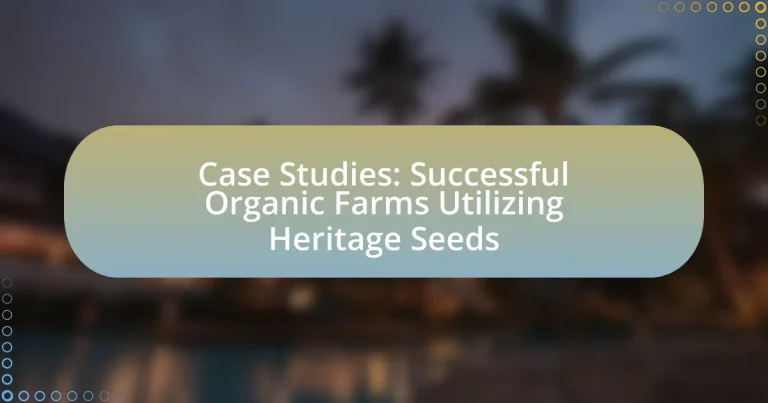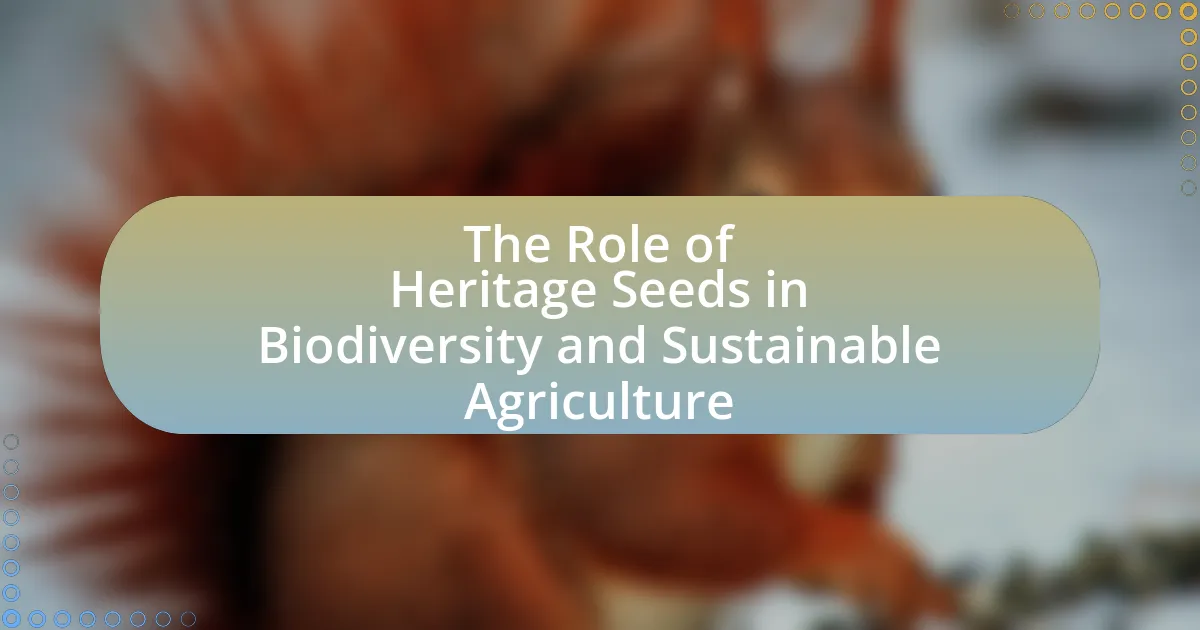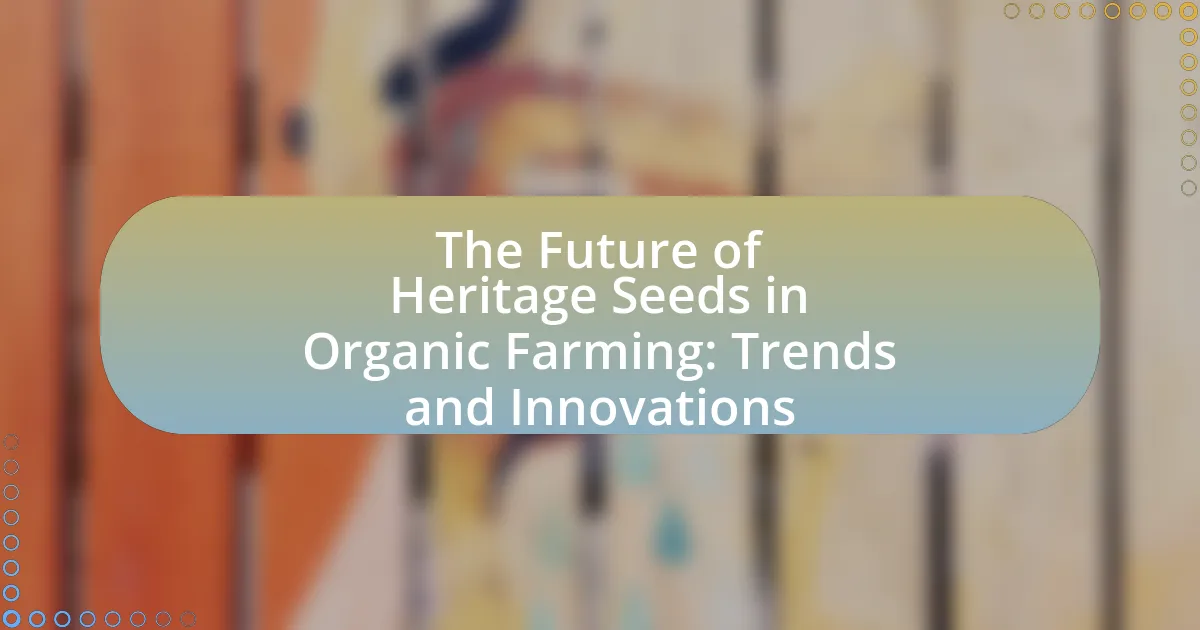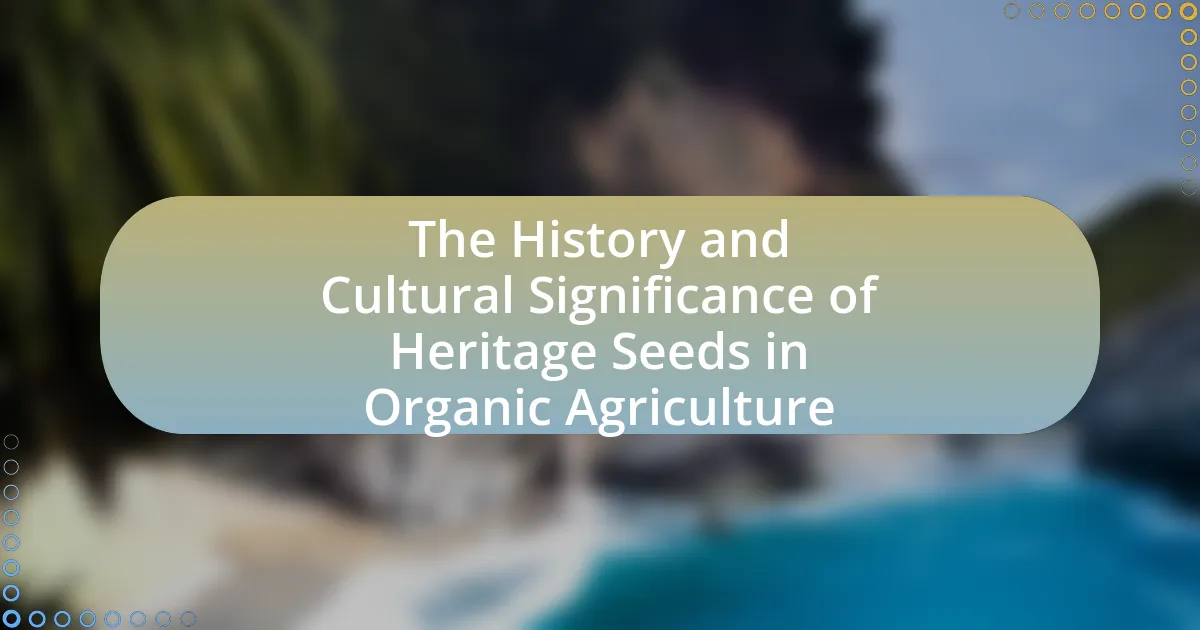Heritage seeds are traditional plant varieties that have been preserved through generations, known for their adaptability, flavor, and genetic diversity. This article explores the significance of heritage seeds in organic farming, highlighting their role in promoting biodiversity, enhancing soil health, and providing resilience against pests and diseases. It contrasts heritage seeds with hybrid and GMO seeds, discusses their sustainability and contributions to ecosystem health, and examines successful case studies of organic farms that utilize these seeds. The article also addresses the economic impacts, best practices for sourcing and preserving heritage seeds, and strategies for marketing produce grown from these varieties.
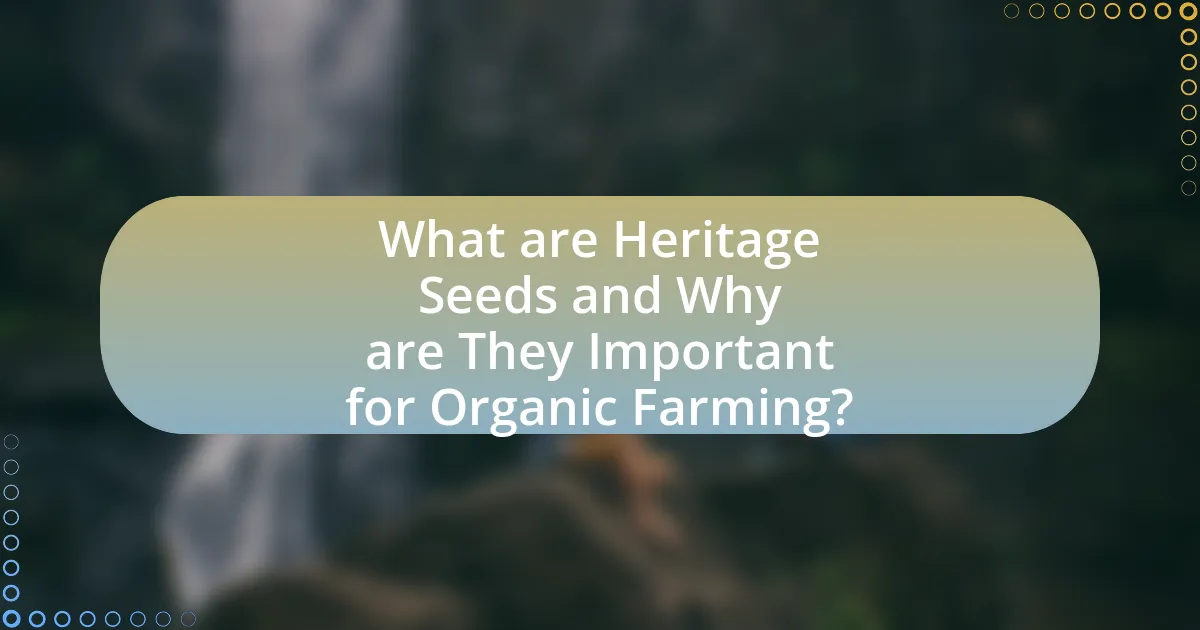
What are Heritage Seeds and Why are They Important for Organic Farming?
Heritage seeds are traditional varieties of plants that have been passed down through generations, often characterized by their adaptability, flavor, and genetic diversity. They are important for organic farming because they promote biodiversity, enhance soil health, and provide resilience against pests and diseases. Research indicates that using heritage seeds can lead to higher nutritional value in crops and better flavor profiles, which are essential for sustainable agricultural practices. Additionally, heritage seeds contribute to the preservation of agricultural heritage and cultural identity, ensuring that diverse plant genetics are maintained for future generations.
How do heritage seeds differ from hybrid and GMO seeds?
Heritage seeds differ from hybrid and GMO seeds primarily in their genetic makeup and breeding processes. Heritage seeds are open-pollinated varieties that have been passed down through generations, maintaining genetic diversity and adaptability, while hybrid seeds result from controlled cross-breeding of two different parent plants to produce specific traits, and GMO seeds are genetically modified organisms that have been altered at the DNA level to exhibit desired characteristics. Heritage seeds often retain traditional flavors and resilience, whereas hybrids may offer uniformity and higher yields, and GMOs can provide pest resistance or herbicide tolerance. The preservation of heritage seeds is crucial for biodiversity, as they contribute to sustainable agriculture and food security.
What characteristics define heritage seeds?
Heritage seeds are defined by their ability to be open-pollinated, which allows them to reproduce true to type in subsequent generations. These seeds are typically non-hybrid and have been passed down through generations, often for at least 50 years, preserving genetic diversity and unique traits. Heritage seeds are known for their adaptability to local growing conditions and their resistance to pests and diseases, which can enhance sustainability in organic farming practices. Additionally, they often possess superior flavor and nutritional value compared to modern hybrids, making them a preferred choice for many organic farmers.
Why are heritage seeds considered more sustainable?
Heritage seeds are considered more sustainable because they promote biodiversity and are adapted to local growing conditions. These seeds have been passed down through generations, allowing them to develop resilience to pests and diseases specific to their environment. Research indicates that heritage varieties often require fewer chemical inputs, such as fertilizers and pesticides, which reduces environmental impact. Additionally, the preservation of heritage seeds contributes to food security by maintaining a diverse gene pool, essential for adapting to climate change and ensuring crop resilience.
What role do heritage seeds play in biodiversity?
Heritage seeds play a crucial role in biodiversity by preserving genetic diversity within plant species. These seeds, often heirloom varieties, maintain traits that are well-adapted to local environments and contribute to the resilience of ecosystems. For instance, heritage seeds can withstand pests and diseases better than modern hybrids, which often rely on chemical inputs. This genetic diversity is essential for food security, as it allows for a wider range of crops that can adapt to changing climate conditions. Studies have shown that farms utilizing heritage seeds can enhance soil health and promote a balanced ecosystem, further supporting biodiversity.
How do heritage seeds contribute to ecosystem health?
Heritage seeds contribute to ecosystem health by promoting biodiversity and resilience in agricultural systems. These seeds, which are open-pollinated and often adapted to local conditions, support a diverse range of plant varieties that can enhance soil health, attract beneficial insects, and reduce the need for chemical inputs. Research indicates that farms utilizing heritage seeds can increase soil organic matter and improve nutrient cycling, leading to healthier ecosystems. For example, a study published in the journal “Agriculture, Ecosystems & Environment” found that farms growing diverse heritage crops had higher levels of beneficial soil microorganisms compared to monoculture systems, demonstrating the positive impact of heritage seeds on ecosystem vitality.
What are the implications of losing heritage seed varieties?
Losing heritage seed varieties has significant implications for biodiversity, food security, and agricultural resilience. The extinction of these seeds reduces genetic diversity, which is crucial for adapting crops to changing environmental conditions and pests. For instance, a study by the Food and Agriculture Organization (FAO) indicates that 75% of the world’s crop diversity has been lost over the last century, primarily due to the replacement of traditional varieties with a limited number of commercial hybrids. This loss threatens the sustainability of food systems, as diverse genetic resources are essential for breeding programs aimed at developing resilient crops. Furthermore, heritage seeds often possess unique flavors and nutritional profiles, contributing to cultural heritage and local economies. The decline in these varieties can lead to a homogenization of food products, diminishing culinary diversity and cultural identity.
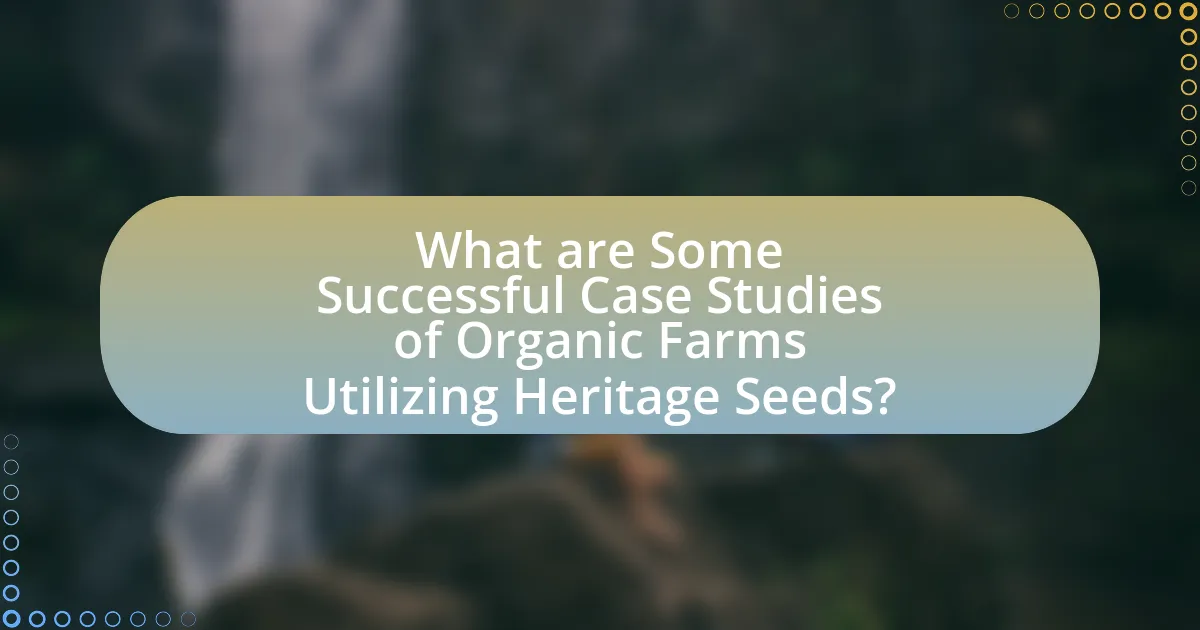
What are Some Successful Case Studies of Organic Farms Utilizing Heritage Seeds?
Successful case studies of organic farms utilizing heritage seeds include the work of the Seed Savers Exchange in Decorah, Iowa, which has preserved over 25,000 varieties of heirloom seeds and promotes biodiversity in agriculture. Another example is the Blue Hill Farm in Massachusetts, which has integrated heritage varieties into its crop rotation, resulting in improved soil health and increased resilience to pests. Additionally, the Rodale Institute in Pennsylvania has demonstrated that organic farming with heritage seeds can yield comparable or higher outputs than conventional methods, while enhancing ecological sustainability. These farms exemplify the benefits of heritage seeds in promoting biodiversity, improving crop resilience, and supporting sustainable agricultural practices.
How have specific farms successfully integrated heritage seeds into their practices?
Specific farms have successfully integrated heritage seeds into their practices by adopting sustainable farming techniques that prioritize biodiversity and soil health. For example, Blue Hill Farm in Massachusetts utilizes heritage seeds to cultivate a diverse range of crops, enhancing resilience against pests and diseases while improving flavor profiles. Additionally, the Rodale Institute has documented that farms using heritage seeds often report higher yields and better adaptability to local climates, as these seeds are well-suited to their specific environments. This integration not only preserves genetic diversity but also supports local ecosystems, demonstrating the effectiveness of heritage seeds in modern agricultural practices.
What farming techniques do these successful farms employ?
Successful farms utilizing heritage seeds employ techniques such as crop rotation, companion planting, and organic pest management. Crop rotation enhances soil fertility and reduces pest buildup by alternating different crops in a specific sequence. Companion planting involves growing compatible plants together to improve growth and deter pests, which is particularly effective in organic farming. Organic pest management focuses on natural methods to control pests, such as introducing beneficial insects or using organic pesticides, thereby maintaining the ecological balance. These techniques are supported by research indicating that they improve biodiversity, soil health, and overall farm productivity.
What challenges did these farms face when adopting heritage seeds?
Farms adopting heritage seeds faced several challenges, including limited availability, lower yields compared to hybrid varieties, and the need for specialized knowledge in seed saving and cultivation techniques. Limited availability often resulted from a lack of commercial production and distribution channels for heritage seeds, making it difficult for farmers to source them consistently. Lower yields were a significant concern, as many heritage varieties do not produce as much as modern hybrids, which can impact profitability. Additionally, farmers needed to acquire specific skills related to seed saving and organic farming practices, which required time and investment in education. These challenges highlight the complexities involved in transitioning to heritage seed cultivation while aiming for sustainable agricultural practices.
What are the economic impacts of using heritage seeds on these farms?
The economic impacts of using heritage seeds on farms include increased biodiversity, reduced seed costs, and improved marketability of products. Heritage seeds often require lower investment in chemical inputs, leading to cost savings for farmers. For instance, a study by the University of California found that farms using heritage seeds reported a 20% reduction in pesticide costs compared to conventional seeds. Additionally, heritage crops can command higher prices in niche markets, enhancing farmers’ income potential. This combination of cost savings and premium pricing contributes to the overall economic viability of farms utilizing heritage seeds.
How do heritage seeds affect crop yields and profitability?
Heritage seeds positively affect crop yields and profitability by promoting biodiversity and resilience in farming systems. These seeds, often adapted to local conditions, can lead to higher yields due to their ability to thrive in specific environments, as evidenced by studies showing that farms using heritage varieties often report increased productivity compared to those relying solely on commercial hybrids. For instance, a study published in the journal “Agriculture, Ecosystems & Environment” found that heritage varieties can yield up to 20% more in certain conditions due to their adaptability and resistance to pests and diseases. Additionally, heritage seeds can enhance profitability by allowing farmers to save seeds for future planting, reducing costs associated with purchasing new seeds each season. This practice not only lowers input costs but also fosters a sustainable farming approach that can lead to long-term economic benefits.
What market opportunities arise from using heritage seeds?
Using heritage seeds creates market opportunities in niche markets, organic farming, and sustainable agriculture. These seeds often appeal to consumers seeking unique flavors, biodiversity, and traditional farming practices, which can command higher prices. For instance, a study by the Organic Trade Association reported that organic food sales reached $62 billion in 2020, indicating a growing demand for organic products, including those grown from heritage seeds. Additionally, heritage seeds can enhance local food systems by promoting regional varieties, thus attracting consumers interested in supporting local farmers and preserving agricultural heritage.

What Best Practices Can Be Learned from These Case Studies?
Best practices learned from case studies of successful organic farms utilizing heritage seeds include the importance of biodiversity, soil health management, and community engagement. Biodiversity enhances resilience against pests and diseases, as demonstrated by farms that incorporate a variety of heritage seed crops, leading to improved yields and sustainability. Effective soil health management practices, such as crop rotation and organic composting, have been shown to increase nutrient availability and soil structure, which are critical for the success of organic farming. Additionally, community engagement fosters knowledge sharing and support networks, as evidenced by farms that collaborate with local organizations to promote heritage seed preservation and education, resulting in stronger local food systems.
What strategies can new organic farmers adopt from successful case studies?
New organic farmers can adopt strategies such as crop rotation, soil health management, and community engagement from successful case studies. For instance, successful organic farms often implement diverse crop rotations to enhance soil fertility and reduce pest pressures, which has been shown to increase yields and sustainability. Additionally, these farms prioritize soil health through practices like composting and cover cropping, leading to improved nutrient availability and resilience against climate variability. Community engagement, including local farmer networks and consumer education, fosters support and market access, as evidenced by case studies highlighting increased sales and customer loyalty.
How can farmers effectively source and select heritage seeds?
Farmers can effectively source and select heritage seeds by connecting with local seed banks, participating in seed exchanges, and researching reputable seed suppliers that specialize in heirloom varieties. Local seed banks often preserve a diverse range of heritage seeds adapted to specific regional climates, which enhances the likelihood of successful cultivation. Seed exchanges allow farmers to trade seeds with others, promoting genetic diversity and access to unique varieties. Additionally, reputable suppliers often provide detailed information about the seed’s history, growth requirements, and disease resistance, which aids farmers in making informed selections. For instance, the Seed Savers Exchange, a well-known organization, offers a vast catalog of heirloom seeds and emphasizes the importance of preserving genetic diversity in agriculture.
What are the best methods for preserving and propagating heritage seeds?
The best methods for preserving and propagating heritage seeds include seed saving, proper storage techniques, and community seed banks. Seed saving involves collecting seeds from mature plants, ensuring they are fully dried and free from disease, which maintains genetic diversity and adapts seeds to local conditions. Proper storage techniques, such as keeping seeds in a cool, dark, and dry environment, can extend their viability for several years; for example, seeds stored at low humidity and temperatures can last up to 10 years or more. Community seed banks play a crucial role by providing a platform for sharing and preserving local seed varieties, fostering biodiversity and resilience in agriculture. These methods are validated by numerous organic farms that have successfully utilized heritage seeds, demonstrating their effectiveness in maintaining agricultural heritage and promoting sustainable practices.
What common pitfalls should farmers avoid when utilizing heritage seeds?
Farmers should avoid the common pitfall of neglecting proper seed selection when utilizing heritage seeds, as this can lead to poor crop performance. Selecting seeds that are not well-suited to the local climate or soil conditions can result in lower yields and increased susceptibility to pests and diseases. Additionally, farmers often overlook the importance of maintaining genetic diversity within their heritage seed stock, which is crucial for resilience against environmental changes and pests. Research indicates that farms with diverse seed varieties are more likely to withstand adverse conditions, thus enhancing sustainability. Lastly, inadequate knowledge of heritage seed cultivation practices can lead to improper planting and care, diminishing the potential benefits of these seeds.
How can farmers ensure they maintain genetic diversity in their crops?
Farmers can maintain genetic diversity in their crops by utilizing a variety of heritage seeds and practicing crop rotation. By selecting and planting multiple heirloom varieties, farmers can ensure a broader genetic base, which enhances resilience against pests and diseases. Research indicates that farms employing diverse seed varieties experience improved yields and sustainability, as demonstrated in studies by the Seed Savers Exchange, which highlights the importance of genetic diversity in agricultural systems. Additionally, implementing crop rotation helps prevent soil depletion and promotes a balanced ecosystem, further supporting genetic diversity.
What are the best practices for marketing heritage seed-grown produce?
The best practices for marketing heritage seed-grown produce include emphasizing the unique qualities of the seeds, building a strong brand narrative, and engaging with local communities. Highlighting the distinct flavors, nutritional benefits, and historical significance of heritage seeds attracts consumers who value authenticity and sustainability. Creating a compelling brand story that connects the produce to its heritage fosters emotional engagement and loyalty among customers. Additionally, participating in local farmers’ markets, community-supported agriculture (CSA) programs, and social media platforms enhances visibility and allows direct interaction with consumers, reinforcing the farm’s commitment to heritage agriculture. These strategies have been shown to increase consumer interest and sales, as evidenced by successful organic farms that have effectively utilized heritage seeds to differentiate their products in a competitive market.
